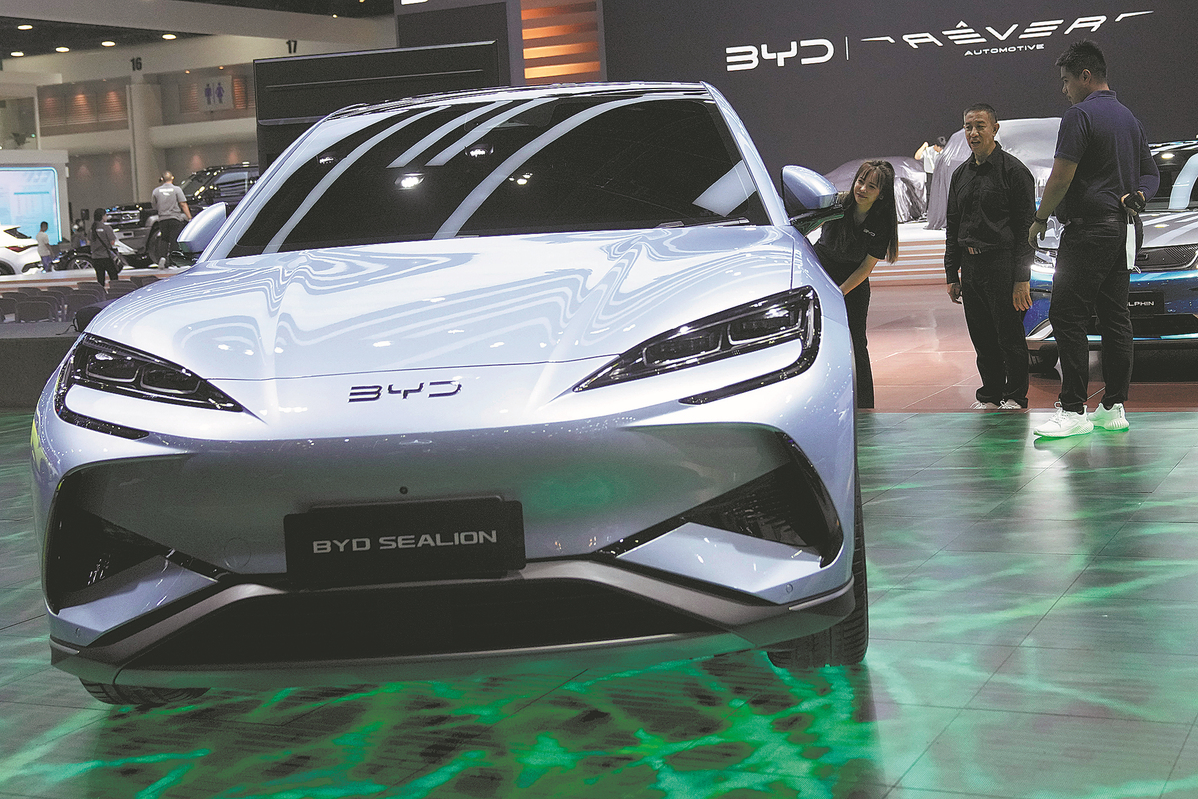US puts new hurdles for Chinese cars
Investigation launched to make it harder for EVs to access market, experts say
By YIFAN XU in Washington | China Daily Global | Updated: 2024-03-28 09:23

The White House's efforts to investigate China-made connected cars is "one additional pathway to make it even harder" for Chinese electric vehicles to access the US market, experts say.
China's connected cars are much superior in terms of competitiveness, Sourabh Gupta, a senior fellow at the Washington-based Institute for China-American Studies, told China Daily.
Although the "connected car" may not necessarily be an EV, compared with traditional fuel cars, EVs tend to use navigation tools, self-driving and other auxiliary functions that rely more on networking technology.
Over the decades, China's automotive industry's competitiveness in traditional fuel vehicles has not been as viable as that of Europe, the United States and Japan.
However, with the international automotive industry shifting focus to new energy vehicles, especially electric vehicles, China's science and technology enterprises began to "change lanes to overtake".
China was the world's top auto exporter in 2023, according to the China Association of Automobile Manufacturers.
Gupta said the US "investigation "or "probe", for purported national security reasons, was an advanced notice of proposed rule-making on connected vehicles from China.
"So that's part of the procedure before you actually write regulations," he said. "You can also frame it as an investigation because it's not that they're going to do this analysis, and then they're just going to put it out and leave it on the website and say, 'OK, this was our analysis.' This analysis will inform specific regulations that will be made, and these will effectively end up with the goal of trying to sideline Chinese EVs from the US market further."
Gary Hufbauer, a nonresident senior fellow at the Washington-based Peterson Institute for International Economics, told China Daily: "I'm afraid the US will declare imported EVs from China a national security risk. If so, this would indicate that there is not much difference between 'de-risking' and 'decoupling.'"
"Even if imported EVs are not declared a national security risk, I expect high trade barriers, whether or not Trump is elected," he said.
Gupta said the EV market "shouldn't be" a national security issue, mentioning that the concern about data that could be gleaned from the cars based on where it has been driven was to some extent "understandable".
"But the fundamental reason that the executive order talks about is that connected vehicles may be connected in the future in a much bigger way to US critical infrastructure, and therefore, the foreign adversary could hijack that infrastructure using the connected vehicle," he said. "And I think that is a very unreasonable proposition. But that's where the main primary thinking is."
Gupta told China Daily: "The bottom line out here is this has much to do with protectionism, and they just don't want to (allow the Chinese cars in).
"So, this avenue through this cybersecurity pathway is one additional pathway to make it even harder for Chinese EVs to access and enter the US market," he said.
The executive order is not the only action the Joe Biden administration has taken to target Chinese EVs.
The Inflation Reduction Act of 2022 specifies that starting in 2024, no EV containing battery components produced by a foreign entity of concern — China, Russia, Iran, and DPRK — will be eligible for tax credit. Gupta said the objective was mainly "to put Chinese vehicles at a competitive disadvantage".
"They are playing both sides of using the national security agreement to essentially prosecute a trade war or a trade battle with China in the EV space," he said.
Discriminatory subsidies
China said on Tuesday that it has initiated dispute-settlement proceedings against the US at the World Trade Organization, saying the "discriminatory subsidies" under the Inflation Act resulted in the exclusion of goods from China and other WTO countries.
Additionally, the current 27.5 percent tariff on Chinese-made vehicles, including the 25 percent imposed by the Trump administration, has largely precluded them from the US market.
Former president Donald Trump, who has won the 2024 Republican presidential nomination, pledged during a campaign stop in Ohio on March 16 to put a 100 percent tariff on imported Chinese vehicles, even if the cars were produced in Mexico.
However, Gupta said, "on the EV topic specifically" Trump may be better for China. "Because China doesn't have a problem taking its know-how and technology and manufacturing overseas. It's already being done in Europe. It's willing to do that, I'm sure, in America, and Trump will welcome that," he said.
"But while Mr Biden is more in the mainstream, where he really wants to ensure that China just is eliminated from the US market, and many of these rules which are being made foreign-entity-of-concern rules, these connected-vehicle rules, the whole purpose of them is to put Chinese cars at a competitive disadvantage rather than to really protect data or to protect national security.
"This is about competitive disadvantage and playing unfair competition rather than national security, even though it is all dressed up as national security," Gupta said.
Gupta also compared the US' blocking of China-made EVs with restricting China in semiconductors.
"I would say chips are, in terms of technological sophistication, that much higher than EV manufacturing and EV batteries," he said. "And the US basically wants to capture the commanding heights of technological superiority. And therefore, even in the chip space, I think the US frames it as national security. But what it wants to do is maintain its technological leadership and keep China as far behind."
Gupta said "the interesting fact between the chips and the EV sector" is that the US government has subsidized both sectors and set strong foreign-entity-of-concern rules. However, the US leadership in the chip sector framed much tougher foreign-entity-of-concern rules than in the EV sector.
























